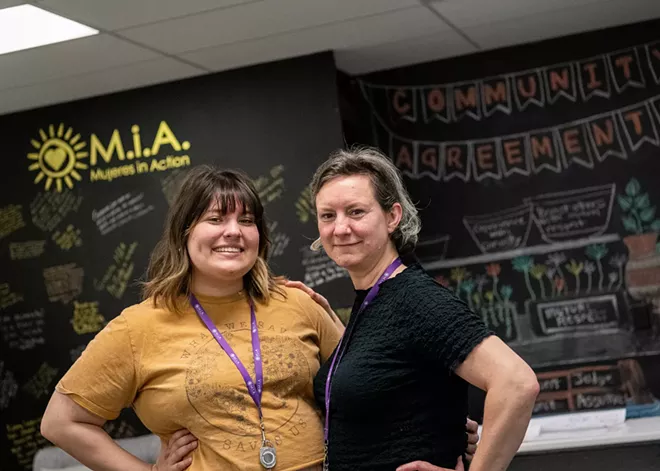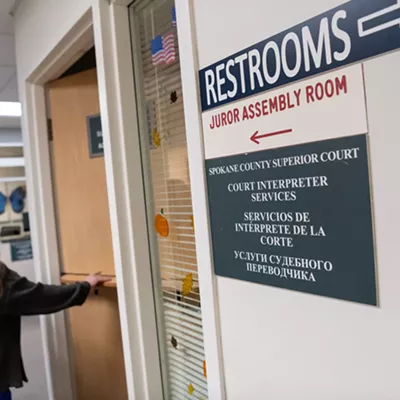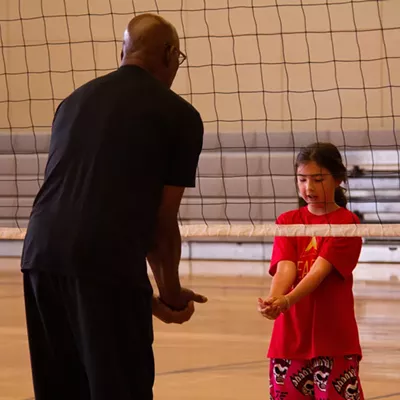
Since 2018, Mujeres in Action (MiA) has been working to end family violence and providing services for Spanish-speaking people in the Inland Northwest who have experienced domestic violence or sexual assault.
The nonprofit has continued to expand its offerings for those survivors — helping them navigate the housing system, search for employment and access education. They've even got a 24/7 volunteer-run bilingual helpline for those who need assistance.
However, most of the nonprofit's programs have been targeted toward Latine adults. (Latine is a relatively new gender-neutral term the organization uses for the population it serves.) So, to help educate youths who may experience similar situations, MiA recently created the Jovenes in Action program.
Jovenes in Action is a three-week leadership program for Spanish-speaking high school students, where they'll learn to talk about domestic violence and sexual assault over six sessions. Participating students will learn what consent and healthy boundaries in relationships look like. They'll also learn how to recognize signs of abuse, and how to report that to the appropriate place.
While engaging in difficult conversations, the topics are presented in a way that's easily digestible for students — such as memes. For example, one meme used in the pilot program features a popular problematic crying face with the words "If they say it's up to you, it counts as consent" while another popular figure representing a decent person's response says "Consent is only when they say yes."
In addition to empowering young people, the Jovenes in Action program makes it easier for the staff at MiA to talk to youth, says Teresa Sorroche, the program supervisor.
"It's complicated to talk with teenagers about healthy relationships and about sexual assault," she says. "So we thought that the best way to address that was a leadership program that we could use for talking about active listening, boundaries and consent."
In 2022, the nonprofit offered a pilot version of the program at Rogers High School, funded by the Women Helping Women Fund, to see if it would be effective for the students involved. MiA's Communications Director Ana Trusty says the team originally hoped to have 10 students participate, but when 14 showed up, they knew it was something they would try to continue offering.
Now, they'll be able to with help from the state. In March, the Washington Department of Health announced that nine organizations, including MiA, would receive a new Communities Building Resilient Youth grant. Totaling $30,000 to $82,000 per year, the grants are intended to create community-led initiatives that will improve youth mental health and well-being and decrease risk factors connected to violence and harm.
MiA received $164,000 that they can use for the Jovenes in Action program until June 2025, Trusty says.
Sorroche says it's important for a MiA to tailor this program for Spanish-speaking youths, because some students may not speak English well, or at all, making other programs that present similar information in English ineffective. Additionally, some words have different meanings depending on if they're used in English or Spanish, she says.
"One of the things that we want to achieve with this program is to know the words that we need to use to communicate to young people, because of course, it's so different," she says.
The program also tries to directly address the cultural norm of machismo. It's defined as "a strong sense of masculine pride," but it goes much deeper than that. Often, it's correlated with the idea of being manly or self-reliant, which Sorroche says makes it almost impossible for some Latine youth to talk about the issues they're having.
"It's really prevalent in our communities, and people don't talk about it because it's so normalized in our experience," Trusty adds. "One in three Latina women will have experienced some sort of violence, and it's usually either sexual or domestic violence."
In addition to creating Jovenes in Action, MiA recently hired Arely Perez, who graduated from high school less than five years ago, as a Youth Child Sexual Assault Advocate, to bring a young adult perspective to the nonprofit.
"I want to implement a little more of what I would have liked to see when I was in leadership, like talking about relationships and how there could be interpersonal violence," Perez says. "I didn't have those conversations as a [teenager], so I'm most excited about bringing that conversation to the table."
Right now, the program is only designed for high school students, but MiA staff hope it evolves over time into something that can be provided in middle school or even elementary school. Sorroche says they just need to figure out how those conversations change depending on the students' ages.
MiA will be holding its first state grant-funded Jovenes in Action program this summer, and students across the city can sign up. When school starts back up in the fall, Trusty says they plan to hold another class for students at Rogers High School. ♦
























